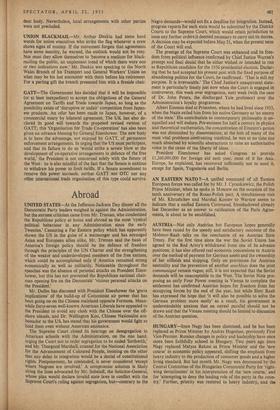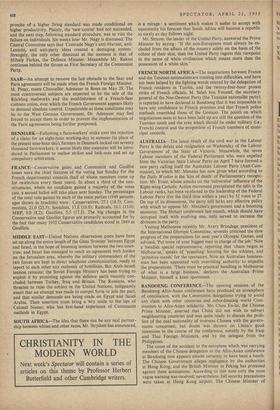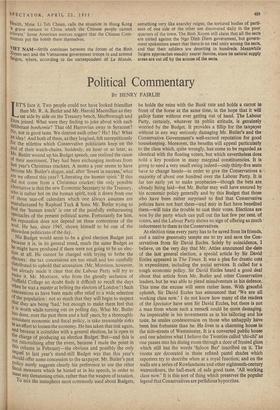Abroad
Mr. Dulles has discussed with President Eisenhower the 'grave implications' of the build-up of Communist air power that has been going on on the Chinese mainland opposite Formosa. Mean- while forty-seven well-known American Liberals have appealed to the President to avoid any clash with the Chinese over the off- shore islands, and Dr. Wellington Koo, Chinese Nationalist am- bassador to the US, has stated that his government would fight to hold them even without American assistance.
The Supreme Court closed its hearings on desegregation in American schools with the Administration, on the one hand, urging the Court not to order segregation to be ended 'forthwith,' and Mr. Thurgood Marshall; counsel for the National Association for the Advancement of Coloured People, insisting on the other that any delay in integration would be a denial of constitutional rights. Postponement, he contended, is never considered 'except where Negroes are involved.' A compromise solution is likely along the lines advocated by Mr. Sobeloff, the Solicitor-General, whose plan would declare invalid state laws in conflict with the Supreme Court's ruling against segregation, but—contrary to the promise of a higher living standard was made conditional on higher productivity. Plainly, the 'new course' had not succeeded, and the next step, following standard procedure, was to visit the failure on individuals. Six weeks later Mr. Nagy is dismissed. The Central Committee says that 'Comrade Nagy's anti-Marxist, anti- Leninist, and anti-party ideas created a damaging system.' Strangely, the only other dismissal at the moment is that of Mihaly Farkas, the Defence Minister. Meanwhile Mr. Rakosi continues behind the throne as First Secretary of the Communist Party.
SAAR—An attempt to remove the last obstacle to the Saar and Paris agreements will be made when the French Foreign Minister, M. Pinay, meets Chancellor Adenauer in Bonn on May 29. The most controversial subjects are expected to be the sale of the Riichling steelworks and the establishment of a French-Saar customs union, over which the French Government appears likely to demand absolute control. Unpalatable as these conditions may be to the West German Government, Dr. Adenauer may feel forced to accept them in order to prevent the implementation of the Paris agreements being further postponed.
DENMARK—Following a farmworkers' strike over the rejection of a claim for an eight-hour working day in summer (in place of the present nine-hour day), farmers in Denmark locked out seventy thousand farmworkers; it seems likely that measures will be intro- duced in Parliament to outlaw strikes and lock-outs and set up compulsory arbitration.
FRANCE—Conservative gains and Communist and Gaullist losses were the chief features of the voting last Sunday for the French departmental councils (half of whose members come up for re-election every three years). In about a third of the con- stituencies, where no candidate gained a majority of the votes cast, a second ballot will take place next Sunday. The percentages of the total vote gained by each of the main parties (1949 percent- ages shown in brackets) were : Conservatives, 27.1 (18.5); Com- munists, 21.0 (23.5); Socialists, 17.8 (16.8); Radicals, 16.1 (13.0); MRP, 9.0 (8.2); Gaullists, 5.5 (17.3). The big changes in the Conservative and Gaullist figures are primarily accounted for by the fact that many 1955 Conservative candidates stood in 1949 as Gaullists.
MIDDLE EAST—United Nations observation posts have been set up along the entire length of the Gaza 'frontier' between Egypt and Israel, in the hope of lessening tension between the two coun- tries; and Israel has managed to reach an agreement with Jordan on the Jerusalem area, whereby the military commanders of the two forces are kept in direct telephone communication, ready to report to each other any outbreak of hostilities, But Arab-Israeli tension remains; the Soviet Foreign Ministry has been trying to exploit it by protesting against the defence pacts recently con- cluded between Turkey, Iraq and Britain. The Russians, who threaten to raise the subject in the United Nations, indignantly assert that an attempt was made to compel Syria to join the pact, and that similar demands are being made on Egypt and Saudi Arabia. Their assertion must bring a wry smile to the• lips of Colonel Nasser, who has first-hand experience of Communist methods in Egypt.
SOUTH AFRICA—The idea that there can be any real partner- ship between whites and other races, Mr. Strydom has announced, is a mirage : a sentiment which makes it easier to accept with equanimity his forecast that South Africa will become a republic
as surely as day follows night. t(
Mr. Strauss, the leader of the United Party, answered the Prime rr Minister by saying: `If the non-Europeans must always be ex- cluded from the affairs of the country solely on the basis of the colour of their skin, then the United Party regrets this viewpoint in the name of white civilisation which means more than the possession of a white skin.'
FRENCH NORTH AFRICA—The negotiations between France and the Tunisian nationalists are running into difficulties, and have not been helped by the fighting words uttered by the delegation of French residents in Tunisia, and the twenty-four-hour protest strike of French officials. M. Salah ben Youssef, the secretary- general of the Neo-Destour Party (the Tunisian nationalist party), is reported to have declared at Bandoeng that it was impossible to have any confidence in French promises and that French police methods resembled those of the Gestapo. The points on which negotiations seem to have been held up are still the question of the Tunisian south and the area which should be under military (i.e., French) control and the proportion of French members of muni- cipal councils.
AUSTRALIA—The latest result of the civil war in the Labour Party is the defeat and resignation on Wednesday of the Labour Government of the State of Victoria. Meanwhile, the seven Labour members of the Federal Parliament who were expelled from the Victorian State Labour Party on April 7 have formed a new party calling itself the Australian Labour Party (Anti-Com- munist), to which Mr. Menzies has now given what according to the Daily Worker is the 'kiss of death' of Parliamentary recogni- tion. Mr. Evatt, whose attacks on the 'subversive' influence of the Right-wing Catholic Action movement precipitated the split in the Labour ranks, has been re-elected to the leadership of the Federal Labour Party (for the third time within a year) by 52 votes to 27. On top of its dissensions, the party still lacks any effective policy with which to oppose Mr. Menzies's government and a booming economy. The Hobart conference last month, which should have occupied itself with evolving one, only served to increase the divisions in the party.
Visiting Melbourne recently Mr. Avery Brundage, president of the International Olympic Committee, severely criticised the slow progress of the preparations for next year's Olympic Games, and advised, 'Put some of your biggest men in charge of the job.' Now a Swedish special representative, reporting that 'chaos reigns at Melbourne,' speaks of 'appalling' housing for the athletes, and 'primitive stands' for the spectators. Now an Australian business- man has been appointed with overriding authority' to expedite the preparations. 'There must be practical handling in Melbourne of what is a large business,' declares the Australian Prime Minister, himself a keen sportsman.
BANDOENG CONFERENCE—The opening sessions of the Bandoeng Afro-Asian conference have produced an atmosphere of conciliation, with the Communist delegations trying to avoid any clash with other countries and subordinating world Com- munism to Afro-Asian solidarity. Mr. Chou En-lai, the Chinese Prime Minister, asserted that China did not wish to subvert neighbouring countries and was quite ready to discuss the prob- lem of the dual nationality of overseas Chinese with the govern- ments concerned; but doubt was thrown on China's good intentions in the course of the conference, notably by the Iraqi and Thai Foreign Ministers, and by the delegate from the Philippines.
The cause of the accident to the aeroplane which, was carrying members of the Chinese delegation to the Afro-Asian conference at Bandoeng now appears almost certainly to have been a bomb. The Chinese Government alleges negligence by the authorities at Hong Kong, and the British Minister in Peking has protested against these accusations. According to this note only the most vague warning was received; nevertheless, full security precautions were taken at Hong Kong airport. The Chinese Minister of
VIET NAM—Strife continues between the forces of the Birth Xuyen sect and the Vietnamese government troops in and around Saigon, where, according to the correspondent of Le Monde, something very like anarchy reigns; the tortured bodies of parti- sans of one side or the other are discovered daily in the poor quarters of the town. The Binh Xuyen still claim that all the sects are united against the Ngo Dinh Diem government, but govern- ment spokesmen assert that there is no real unity among the sects, and that their soldiers are deserting in hundreds. Meanwhile Saigon approaches, steadily nearer famine, since its natural supply areas are cut off by the armies of the sects.












































 Previous page
Previous page